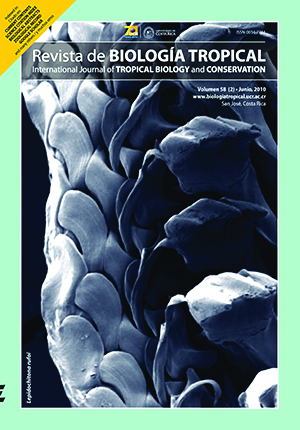Abstract
The study of biochemical activity of extracts obtained from marine organisms is gaining interest as some have proved to have efficient health or industrial applications. To evaluate lethality and antimicrobial activities, some chemical tests were performed on crude extracts of the octocorals Eunicea sp., Muricea sp. and Pseudopterogorgia acerosa and the mollusks Pteria colymbus, Phyllonotus pomum and Chicoreus brevifrons, collected in Venezuelan waters. The presence of secondary metabolites like alkaloids, unsaturated sterols and pentacyclic triterpenes in all invertebrates, was evidenced. Additionally, sesquiterpenlactones, saponins, tannins, cyanogenic and cardiotonic glycosides were also detected in some octocoral extracts, suggesting that biosynthesis of these metabolites is typical in this group. From the lethality bioassays, all extracts resulted lethal to Artemia salina (LC50<1.000μg/ml) with an increased of lethal activity with exposition time. P. pomum extract showed the highest lethality rate (LC50=46.8μg/ml). Compared to the octocorals, mollusks extracts displayed more activity and a greater action spectrum against different bacte-rial strains, whereas octocorals also inhibited some fungi strains growth. Staphylococcus aureus was the most susceptible to the antimicrobial power of the extracts (66.7%), whereas Pseudomonas aeruginosa,Candida albi-cans and Aspergillus niger were not affected. The antibiosis shown by marine organisms extracts indicates that some of their biosynthesized metabolites are physiologically active, and may have possible cytotoxic potential or as a source of antibiotic components.
##plugins.facebook.comentarios##

This work is licensed under a Creative Commons Attribution 4.0 International License.
Copyright (c) 2010 Revista de Biología Tropical






